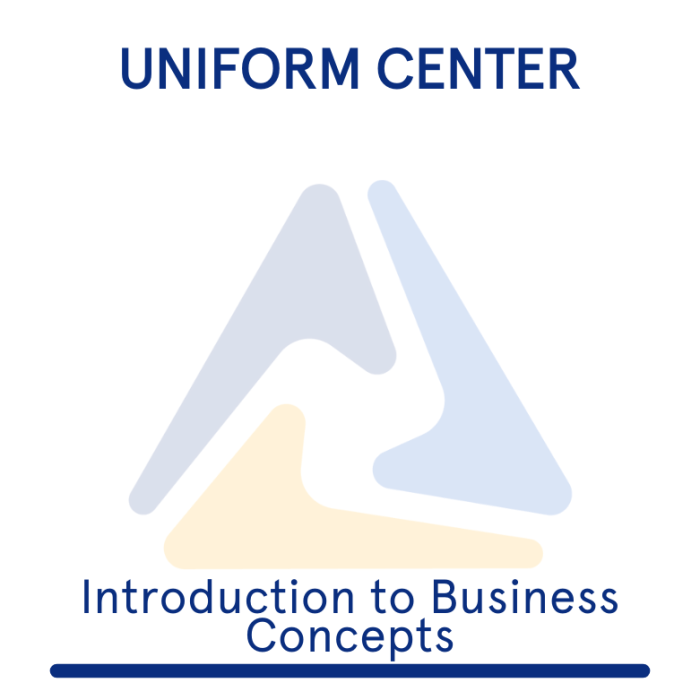Introduction to business concepts fbla – Introduction to Business Concepts for FBLA members provides a thorough understanding of fundamental business principles, marketing strategies, operations management techniques, human resource management practices, financial management strategies, information technology applications, and business ethics and social responsibility.
This comprehensive guide will equip you with the knowledge and skills necessary to succeed in the business world.
Business Fundamentals

Business fundamentals form the foundation of any successful business venture. These principles encompass the core concepts that drive business operations, including profit, loss, revenue, and expenses. Understanding these fundamentals is crucial for making informed decisions and navigating the complexities of the business world.
Types of Business Organizations
- Sole Proprietorship: A business owned and operated by a single individual.
- Partnership: A business owned and operated by two or more individuals.
- Corporation: A legal entity separate from its owners, offering limited liability to its shareholders.
Successful Business Strategies
Numerous successful businesses have emerged over time, each employing unique strategies to achieve their goals. Some common strategies include:
- Target Marketing: Identifying and focusing on specific customer segments.
- Product Differentiation: Creating products or services that stand out from competitors.
- Cost Leadership: Offering products or services at a lower cost than competitors.
Marketing and Sales

Marketing and sales play a pivotal role in driving business growth and profitability. Marketing involves creating awareness and generating interest in products or services, while sales focuses on converting that interest into actual purchases.
Marketing Strategies
- Target Marketing: Identifying and focusing on specific customer segments.
- Product Differentiation: Creating products or services that stand out from competitors.
- Pricing: Determining the optimal price for products or services.
Effective Marketing Campaigns, Introduction to business concepts fbla
Effective marketing campaigns have the power to capture attention, generate leads, and drive sales. Examples of successful marketing campaigns include:
- Nike’s “Just Do It” campaign, which inspired consumers to pursue their athletic goals.
- Apple’s “Think Different” campaign, which positioned the brand as a leader in innovation.
- Coca-Cola’s “Share a Coke” campaign, which encouraged consumers to connect with friends and family.
Operations Management

Operations management encompasses the processes and systems involved in producing and delivering products or services. Efficient operations management ensures that businesses can meet customer demand while minimizing costs.
Aspects of Operations Management
- Production: Planning, scheduling, and controlling the production process.
- Inventory: Managing the flow of goods from suppliers to customers.
- Quality Control: Ensuring that products or services meet established standards.
Successful Operations Management Strategies
Companies that have implemented successful operations management strategies have achieved significant improvements in efficiency and productivity. Examples include:
- Toyota’s “Just-in-Time” inventory system, which reduced waste and improved production efficiency.
- Amazon’s fulfillment centers, which leverage technology to optimize order fulfillment and delivery.
- Zara’s fast-fashion model, which enables the company to respond quickly to changing consumer trends.
Human Resource Management: Introduction To Business Concepts Fbla
Human resource management (HRM) is essential for attracting, developing, and retaining a talented workforce. HRM practices impact employee morale, productivity, and overall business success.
Role of Human Resource Management
HRM plays a crucial role in:
- Recruitment and Selection: Hiring the right candidates for the organization.
- Training and Development: Enhancing employee skills and knowledge.
- Employee Relations: Maintaining a positive and productive work environment.
Successful Human Resource Management Strategies
Companies that have implemented successful HRM strategies have experienced improved employee engagement, reduced turnover, and increased productivity. Examples include:
- Google’s “20% time” policy, which allows employees to spend 20% of their work time on personal projects.
- Zappos’s “holacracy” model, which empowers employees to make decisions and manage themselves.
- Netflix’s “no rules” culture, which gives employees freedom and flexibility.
Essential Questionnaire
What are the basic principles of business?
The basic principles of business include profit, loss, revenue, and expenses.
What are the different types of business organizations?
The different types of business organizations include sole proprietorships, partnerships, and corporations.
What is the importance of marketing in business?
Marketing is important in business because it helps businesses reach their target audience, promote their products or services, and generate sales.